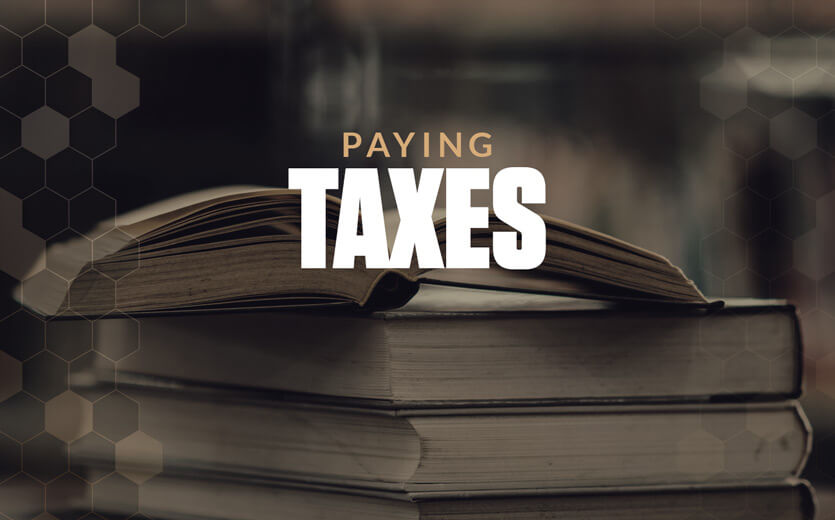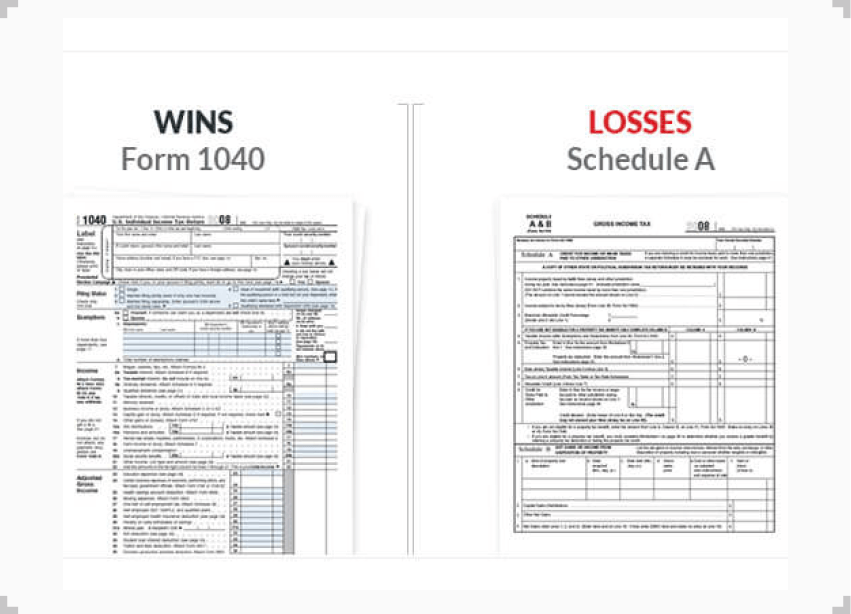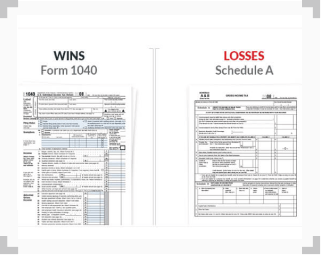Paying Tax on Your Sports Betting Profits is Simple (Kind Of)

- Residents of the United States must report sports bet winnings to the federal government
- It is your responsibility to report earnings – sportsbooks will not do this for you
- Keep track of wins and losses to properly complete tax forms when the time comes
Filing income tax returns is never enjoyable, but we’ve all got to face the taxman. If you live in the United States (and you’ve netted some cash betting on sports online), you have to report your winnings to remain tax compliant. The last thing anyone wants is to be audited, or even worse: hit with a fine or criminal charge.
Doing your taxes is often just as confusing as it is boring. No matter where you turn, you’re likely to get a different answer. That’s why we’ve created this catch-all guide for everything you need to know about sports betting winnings when the tax season approaches.
Before we continue, we’re obliged to inform you that while we can point you in the right direction for filing your taxes on your sports betting winnings, we are not attorneys and can’t provide you with legal advice. If you have more questions or specific queries as to how to pay your taxes under the exact letter of the law, consult a CPA (Certified Professional Account) or a tax lawyer.
There Are No Tax Exemptions in the United States
Gambling is technically categorized as taxable income by the IRS. Winnings are not capital gains, which are subject to a different set of rules.
Unlike the UK or Canada, American bettors must pay taxes on any winnings that exceed $600 in a single year (or on a bet valued at 300 times the initial wager). Any and all winnings – from the lottery to bets placed at online sportsbooks – must be reported when you file taxes, even if they do not exceed $600.
Any and all winnings – from the lottery to bets placed at online sportsbooks – must be reported when you file taxes.
Please note that this $600 doesn’t refer to profit alone. This $600 applies to your total winnings when betting on sports, irrespective of sports betting losses. You can report your betting losses as deductions on your tax form, but they do not affect the $600 threshold for tax liability.
How to Accurately Report Your Wins and Losses
Note: This advice is directed at recreational sports bettors, not sharps. Sharps who rely on sports betting winnings as their primary source of income face a different process to comply with tax laws.
Reporting your sports betting winnings is easy if you’re just a regular casual sports bettor. There are two forms you’ll need to complete to report your gambling activity: Form 1040 and Schedule A.


On Tax Form 1040, simply total your sports betting winnings and put that figure in the “Other Income” spot. This is line 21 of form 1040. You can report your losses as an itemized deduction. These deductions are reported on your Schedule A form.
You will pay taxes on your net winnings (or your wins minus your losses). This means that if you’ve won $500 on sports, but lost $1000, you can deduct the $500 you’ve lost. As such, it is critical that you report your losses.
You might recall that as part of our strategy guide, we recommended that you carefully record both your wins and your losses.
In addition to tax purposes, this is extremely crucial for both improving your winning percentage and growing your bankroll. If you’ve recorded all your bets carefully (both the wins and losses) you shouldn’t have any issues properly filing your taxes.
What About Paying State Taxes?
If you live in Florida, Nevada, South Dakota, Texas, Washington, Wyoming, or Alaska, you don’t pay any state income taxes. In a similar vein, if you reside in either Tennessee or New Hampshire, you’re only obliged to pay state tax on dividends and capital gains from your investments, and nothing else.
You are not required to pay state taxes on sports bet winnings in Alaska, Florida, New Hampshire, South Dakota, Tennessee, Texas, Washington, or Wyoming.
In these states, you aren’t required to pay state tax on sports betting winnings, but you still need to pay federal income tax to the Internal Revenue Service (IRS).
If you don’t reside in one of these states, you’ll need to report your sports betting winnings on your state tax return as well. We can’t give you details on how to pay your state tax but the process should be similar to paying federal tax. Once you get comfortable, completing your state tax form is rather straightforward.
I Live in the UK – Do I Need to Pay Taxes on Sports Bets?
In the UK, casual sports bettors are not required to report gambling wins on their taxes, nor are they taxed on their winnings. Instead, sports betting winnings are categorized as something called windfall profits, which are profits obtained thanks to unexpected, fortuitous events. Most types of windfall profits are not taxed in the UK.
There is a noticeable exception to this rule in the UK. If you are a professional sharp – and your primary income source is betting on sports – you’ll be able to code your losses (and even your travel expenses) as deductions, but you’ll need to pay tax on your overall profits.
Why Do We Have To Pay Tax On Sports Bets?
From those who own and operate sportsbooks to those who place sports wagers around the world, one thing drives all bettors: cold hard cash. An incredible amount of money is spent on gambling in the United States each year, and the government gets its piece.
Across the US, taxes from bettors’ winnings are an integral part of state economies. In many cases, these taxes are used to fund education and other public works projects.
What Do Sportsbooks Say About Paying Taxes on Your Winnings?
It’s important to understand that paying taxes on your winnings is your responsibility. The majority of the sportsbooks we review serve an international audience, and they don’t have the resources, authority, or desire to assist with their clients’ taxes.
Sportsbooks use the correct language to ensure that they won’t incur any responsibility for customers who fail to complete their taxes accurately, honestly, and competently.
If I Don’t Withdraw From My Sportsbook, Can I Avoid Reporting Winnings?
We don’t recommend this course of action under any circumstances. You may have heard rumors that online sports betting winnings aren’t taxable if bettors keep them deposited at their online sportsbooks. This is a total myth. As the IRS itself says: “[citizens] are taxed on income that is available to you, regardless of whether or not it is in your possession.”
You may have heard rumors that online sport betting winnings aren’t taxable if bettors keep them deposited at their online sportsbooks. This is a total myth.
By the letter of the IRS’ Tax Law, it makes no difference whether your money is held at your online sportsbook or in your bank account. Additionally, it doesn’t matter if you’re technically placing bets offshore. As a US citizen, winnings that you come into possession of count as income.
One thing that we can say for sure is that win or lose, not many people come away from fighting with the IRS happy. Avoid messing with them at all costs!
What Would Happen If I Didn’t Report My Winnings?
Though it’s unlikely that the IRS will send you behind bars, you technically risk jail time if you incorrectly fill out any portion of your tax form. There’s a stronger chance that they’ll hit you with a steep fine. You’re also likely to get audited, which is never any fun.
The consequences of filing a tax form incorrectly/fraudulently varies. The fine can be as high as $250,000, and –in the worst case scenario – the IRS can smack you with criminal charges and a maximum jail sentence of three years.
For even the smallest dollar amounts that go unreported, fines can go all the way up to $5,000 (plus 100% of the back taxes that you still owe).
In short, it’s not worth it to avoid accurately reporting your winnings.
It’s Easy to Pay Your Taxes Efficiently and Legally!
Paying your taxes isn’t nearly as much of a headache as you’d think. In fact, it’s extremely straightforward (as long as you’re keeping track of your wins and losses).
In addition to helping you with tax information, we can help you improve your winning percentages, too. At SportsBettingDime.com, we cover everything from the fundamentals and basics of betting to more advanced strategies to use in your sports bets.

Evergreen Writer/Editor; Sportsbook Expert
With nearly two decades of experience in sports media, Paul Costanzo turned his professional attention to sports betting and online gambling in January of 2022. He's covered every angle of the industry since then, managing and creating content for PlayMichigan and The Sporting News, and now SBD.



